 [posted by Jonathan Watss on The Guardian, January 10, 2018] Ecuador’s state oil company has begun drilling the first of 97 planned wells inside a new field of the Yasuní national park, one of the world’s biodiversity hotspots.
[posted by Jonathan Watss on The Guardian, January 10, 2018] Ecuador’s state oil company has begun drilling the first of 97 planned wells inside a new field of the Yasuní national park, one of the world’s biodiversity hotspots.
The opening of the Tambococha-2 well has triggered fierce criticism from conservationists, who say President Lenín Moreno is backtracking on a promise to protect the Amazon and pay greater heed to the opinion of indigenous groups.
This is the second phase of the controversial Ishpingo-Tambococha-Tiputini (ITT) project, which started in 2016. Environmentalists say it goes deeper into the national park.
At Tambococha-2, Petroamazonas will take eight days to drill down 1,800 metres to tap a reserve estimated at 287m barrels of crude, the company said. In the coming months and years, it plans to build four platforms and drill almost 100 wells.
The company insists it will do so unobtrusively by concentrating drilling in a small area, burying pipes and putting in place precautions against spills.
But critics say it is impossible to guarantee zero impact on such a biologically sensitive area. They say the opening of roads and influx of workers is likely to accelerate deforestation, hunting and colonisation and could result in conflict with two isolated nomadic tribes.
It is a conundrum for Moreno, who was praised by environmentalists last year after promising the United Nations he would do more to protect the Amazon. He has agreed greater consultation with local communities before granting new mining concessions and Ecuador will shortly hold a referendum on whether to expand protections for Yasuní.
That may come too late, given Petroamazonas’s latest move, which is the most intrusive development yet in the ITT area of Yasuní.
“Drilling in Yasuni directly contradicts Moreno’s UN pledge and the expanded protections proposed in the referendum,” said Carlos Mazabanda, Ecuador field coordinator with Amazon Watch.
“It also contradicts Ecuador’s constitution, which recognises the rights of nature and seeks to protect sensitive ecosystems from ‘activities that could lead to species extinction, the destruction of ecosystems, or the permanent alteration of natural cycles’.”
Yasuní was once a beacon of hope for global conservation. In 2007, former president Rafael Correa offered to leave the oil in the ground in return for $3.6bn (£3bn) compensation from the global community, but the plan was scrapped six years later with less than 10% of the target figure raised.
